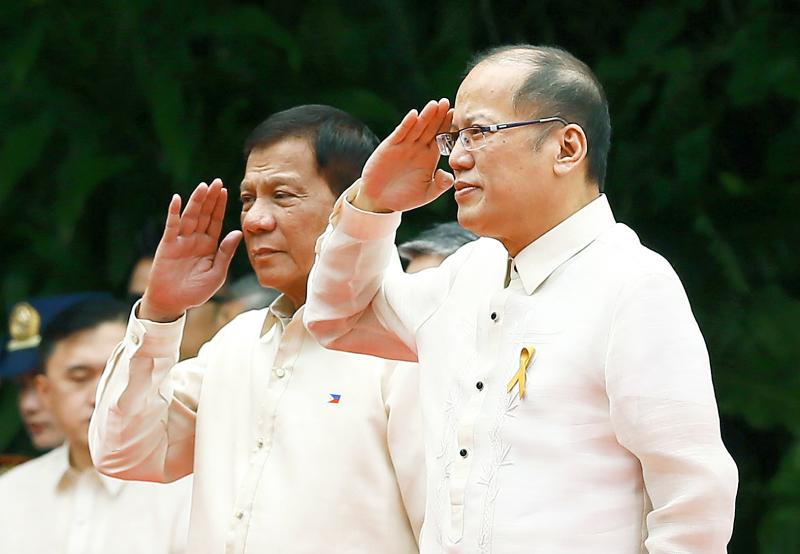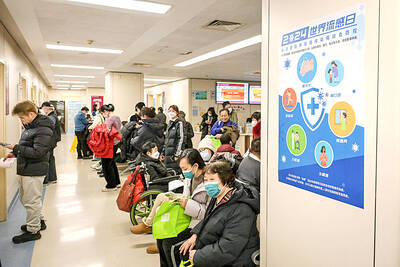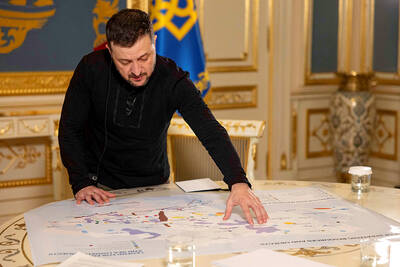Former Philippine president Benigno “Noynoy” Aquino III, the reserved scion of one of Asia’s most famous political families, died yesterday from kidney failure. He was 61.
Aquino, who was in office from 2010 to 2016, was the only son of former Philippine president Corazon Aquino and her assassinated husband, former Philippine senator Benigno “Ninoy” Aquino, both revered for leading the struggle to restore democracy in the nation.
Philippine President Rodrigo Duterte’s spokesman announced “Ninoy” Aquino’s death hours after local media reported that the former leader had been rushed to a Manila hospital.

Photo: AP
“We commiserate and condole with the family and loved ones of former president Benigno Simeon ‘Noynoy’ Aquino III,” presidential spokesman Harry Roque said. “We are grateful to the former president for his contributions.”
The unmarried politician “died peacefully in his sleep,” said Pinky Aquino-Abellada, one of Aquino’s four sisters.
“No words can express how broken our hearts are and how long it will take for us to accept the reality that he is gone,” said Aquino-Abellada, reading from a statement outside the mortuary.
“Noy, mission accomplished,” she added.
Philippine Secretary of Foreign Affairs Teodoro Locsin wrote on Twitter that “Ninoy” Aquino was “brave under armed attack, wounded in crossfire, indifferent to power and its trappings, and ruled our country with a puzzling coldness, but only because he hid his feelings so well it was thought he had none.”
“Ninoy” Aquino, who was succeeded by populist strongman Duterte, waged an anti-corruption campaign during a term that ushered in key economic reforms.
“Ninoy” Aquino was born on Feb. 8, 1960, to one of the country’s wealthiest land-owning political families.
A latecomer to the presidential race in 2010, he declared his candidacy only after his mother’s death from cancer the previous year had plunged the country into mourning and demonstrated the power of the family name.
He made fighting corruption his mantra, capitalizing on his family’s clean reputation, and vowed to reduce the poverty afflicting a third of the population.
His administration delivered average annual economic growth of about 6 percent, the highest since the 1970s, handing the country investment-grade status — but poverty remained endemic.
Unlike Duterte, “Ninoy” Aquino put the Philippines’ long-running dispute with China over competing claims to the South China Sea at the top of his foreign policy agenda.
He launched a landmark case with a UN-backed tribunal to challenge Beijing’s claims to most of the sea, which ruled in favor of the Philippines — even though Beijing rejected the decision.

Thousands gathered across New Zealand yesterday to celebrate the signing of the country’s founding document and some called for an end to government policies that critics say erode the rights promised to the indigenous Maori population. As the sun rose on the dawn service at Waitangi where the Treaty of Waitangi was first signed between the British Crown and Maori chiefs in 1840, some community leaders called on the government to honor promises made 185 years ago. The call was repeated at peaceful rallies that drew several hundred people later in the day. “This government is attacking tangata whenua [indigenous people] on all

RIGHTS FEARS: A protester said Beijing would use the embassy to catch and send Hong Kongers to China, while a lawmaker said Chinese agents had threatened Britons Hundreds of demonstrators on Saturday protested at a site earmarked for Beijing’s controversial new embassy in London over human rights and security concerns. The new embassy — if approved by the British government — would be the “biggest Chinese embassy in Europe,” one lawmaker said earlier. Protester Iona Boswell, a 40-year-old social worker, said there was “no need for a mega embassy here” and that she believed it would be used to facilitate the “harassment of dissidents.” China has for several years been trying to relocate its embassy, currently in the British capital’s upmarket Marylebone district, to the sprawling historic site in the

A deluge of disinformation about a virus called hMPV is stoking anti-China sentiment across Asia and spurring unfounded concerns of renewed lockdowns, despite experts dismissing comparisons with the COVID-19 pandemic five years ago. Agence France-Presse’s fact-checkers have debunked a slew of social media posts about the usually non-fatal respiratory disease human metapneumovirus after cases rose in China. Many of these posts claimed that people were dying and that a national emergency had been declared. Garnering tens of thousands of views, some posts recycled old footage from China’s draconian lockdowns during the COVID-19 pandemic, which originated in the country in late

BACK TO BATTLE: North Korean soldiers have returned to the front lines in Russia’s Kursk region after earlier reports that Moscow had withdrawn them following heavy losses Ukrainian President Volodymyr Zelenskiy on Friday pored over a once-classified map of vast deposits of rare earths and other critical minerals as part of a push to appeal to US President Donald Trump’s penchant for a deal. The US president, whose administration is pressing for a rapid end to Ukraine’s war with Russia, on Monday said he wanted Ukraine to supply the US with rare earths and other minerals in return for financially supporting its war effort. “If we are talking about a deal, then let’s do a deal, we are only for it,” Zelenskiy said, emphasizing Ukraine’s need for security guarantees